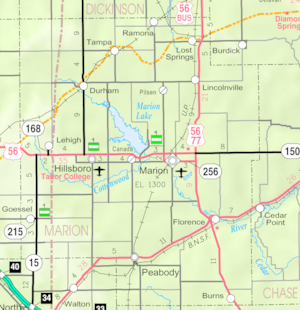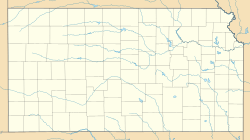Gnadenau, Kansas facts for kids
Quick facts for kids
Gnadenau, Kansas
|
|
|---|---|

Burdei-type housing in Gnadenau
(Frank Leslie's Illustrated March 20, 1875) |
|

|
|
| Country | United States |
| State | Kansas |
| County | Marion |
| Township | Liberty |
| Founded | 1874 |
| Elevation | 1,378 ft (420 m) |
| Population | |
| • Total | 0 |
| Time zone | UTC-6 (CST) |
| • Summer (DST) | UTC-5 (CDT) |
| Area code | 620 |
| GNIS ID | 477356 |
Gnadenau was once a small village in Marion County, Kansas, United States. It was founded by German-speaking Mennonite families who moved there from Russia. Today, Gnadenau is known as a ghost town, meaning there are no buildings left, but its history is still remembered. It was located about 2 miles (3.2 km) southeast of Hillsboro. The old Gnadenau Cemetery is still there.
The Story of Gnadenau
Early Times in Kansas
For thousands of years, the vast Great Plains of North America were home to nomadic Native American tribes. They moved around, following animals and seasons.
Later, from the 1500s to the 1700s, France claimed a huge part of North America. But in 1762, after a big war called the French and Indian War, France secretly gave this land to Spain. This was part of a deal called the Treaty of Fontainebleau.
How Kansas Became a State
In 1802, Spain gave most of the land back to France. Then, in 1803, the United States bought a huge area of land from France. This was called the Louisiana Purchase. Most of what is now Kansas was part of this big purchase. The U.S. paid about 2.83 cents per acre for it.
In 1854, the Kansas Territory was set up. Then, in 1861, Kansas officially became the 34th U.S. state. In 1855, Marion County was created within the Kansas Territory. This county included the land where Gnadenau would later be built.
The Founding of Gnadenau
In 1874, a group of German-speaking Mennonites from a place called Annefeld near Simferopol, Crimea, Russia, decided to move to the United States. They left Russia because the government took away their special rule that excused them from military service. Mennonites believe in not fighting or joining the army.
In August 1874, this group arrived at the spot in Kansas and named their new village Gnadenau. This name means Meadow of Grace or Grace Meadow. These Mennonites were a bit different from most other Mennonites. They practiced a special way of baptism called trine forward immersion.
The Village Changes
The beginning of the end for Gnadenau village happened in 1879. A railway company, the Marion and McPherson Railway Company, built train tracks just north of the village. They also started a new town nearby called Hillsboro. As Hillsboro grew, people slowly moved away from Gnadenau.
Gnadenau Today
Today, no buildings are left in Gnadenau, which is why it's called a ghost town. However, a special monument called the Gnadenau Village Memorial still stands there. It helps people remember the history of this unique settlement.
Where Gnadenau Was Located
Gnadenau was located at 38°19′34.413″N 97°10′49.882″W / 38.32622583°N 97.18052278°W (38.326226, -97.180523). It was along 175th Street, between Jade Road and Kanza Road, in Marion County, Kansas. Most of the people who lived there had their homes on the north side of 175th Street. The Gnadenau Village monument is on the south side of 175th Street. The Gnadenau Cemetery is right behind it.
Places to Visit Nearby
- Mennonite Settlement Museums, 501 South Ash Street, Hillsboro. The main museum is on Memorial Drive, one block west.
- The Jacob Friesen Flouring Wind Mill is a detailed copy of the windmill that stood in Gnadenau in 1876.
 | Kyle Baker |
 | Joseph Yoakum |
 | Laura Wheeler Waring |
 | Henry Ossawa Tanner |



